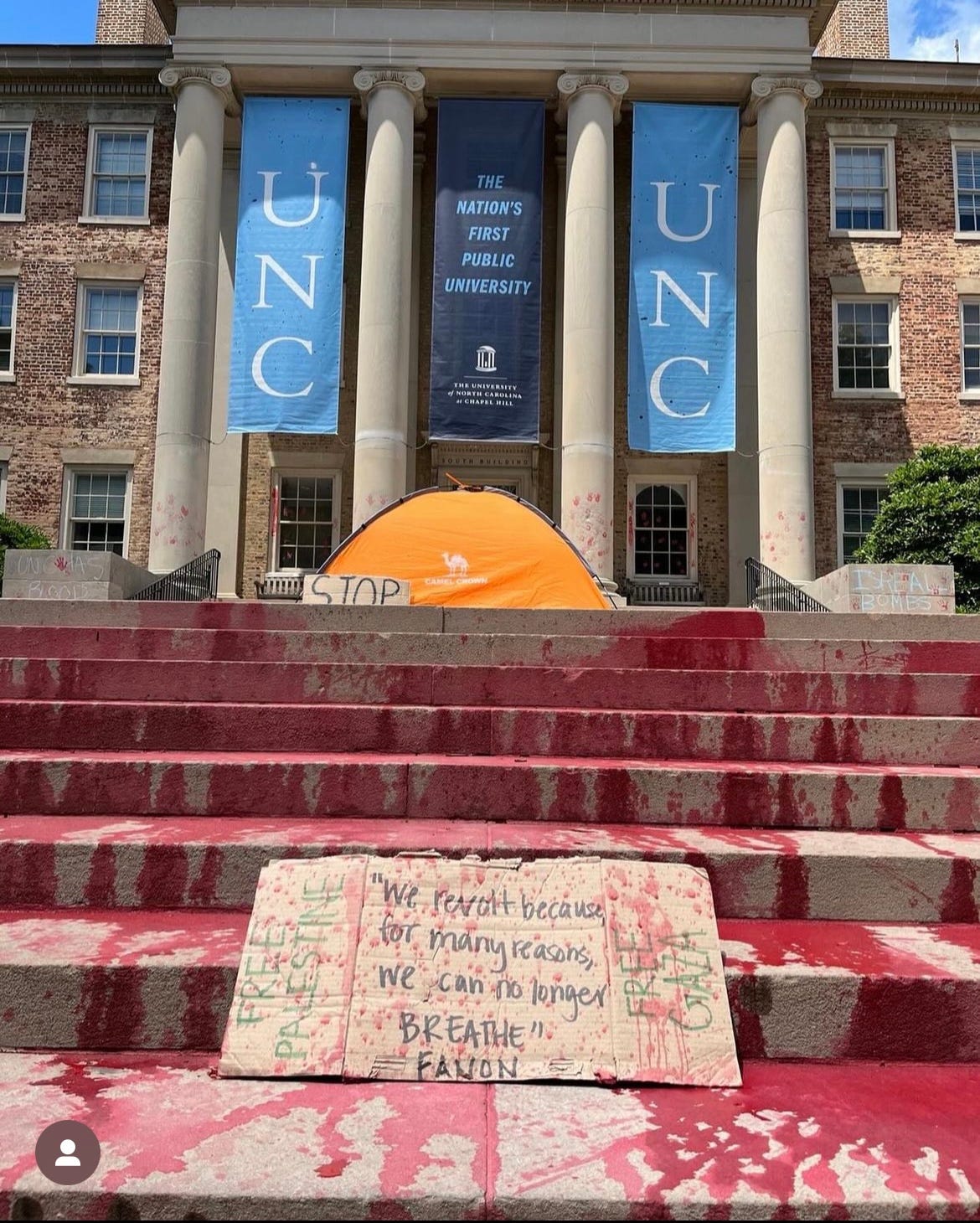"If it isn't this, it won't be anything."

While I sit in my stiff desk chair prepared to start my exam, I ruminate about books and posters I should have saved from the encampment, because now it’s gone. It’s 1:36 PM, and I had wisps of leftovers food since the morning. If I had eaten more, I wouldn’t be this hungry now. People called to tell me about their daily happenings this week, but my mind kept going back to what people were doing at the university encampment. Abstracting about how things should have happened this week is not about saving books, or eating breakfast at a different time, or phone calls—the anxiety is over wishing for a different reality altogether. It doesn’t have to unfold like this, I think to myself. I wish it hadn’t. This quote encapsulates the desperation of the moment:
“If it isn’t mass graves, it won’t be anything. If it is decided that this is fine, unworthy of urgent action, then there is nothing that won’t be allowed. It’s one thing to know and understand this in a general sense, just by looking at years and years of history. But one would still hope that mass graves being uncovered, filled with handcuffed people who were executed, would be a turning point. If it isn’t this, it won’t be anything. And if it won’t be anything, I am afraid for what that means, not just today and not just for the Palestinian people, though that is where my most urgent fears are. But I’m afraid of what it means for the world, for whatever brutalities might come that will be allowed, treated with apathy.”
-credited to @ nifmuhammad from
I scroll through my feed and see children covered in rubble residue (don’t we all?). They cry for their guardians, who may or may not be alive anymore. It’s unadulterated human suffering. When we walk by a man sleeping on the ground, or a veteran in poverty, or someone with a serious health condition with no health coverage, we see inequity—a manifestation of government’s violence on an individual. When we see death—violence laid bare—and see the United States taking minimal actions to prevent it, it feels like it won’t be anything.
I receive emails about whether I’ve addressed the tasks for American health insurance, but based on the genocide in Gaza, we cannot agree on what it means to die a premature death. I have a meeting about American prescription prices, but you do not recognize Palestine’s collapsed health system which has little to no preventive care, only emergency care. If there is no action to stop children’s open bombardment in Rafah, then how can we address insidious children’s health inequities in America? Working towards human rights equality requires the ability to recognize its most basic violations. If the moral compass is difficult to calibrate when violence is overt, then the direction is much more difficult to balance in the silence of people’s complacency. We have to speak up.
“If we lived in the 1800s and people chained me and my family to blocks to be sold, I’d hope people would start pitching some damn tents. If we made train engines that transported people to concentration camps during the Holocaust, I’d hope people would start pitching some damn tents,” said a professor at a USC protest. These encampments should be looked upon as the self-evident course of action to take, not the mystifying one.
Two days after encampments are torn down, people scream outside of the house of their university’s president. People pitch more encampments in different locations. Faculty set up tents in the place of students. People project rallying slogans onto university buildings. We will not stop, we will not rest. Such creative actions, weaving around the obstacles erected by administration, beget more courage.
Gaza is everything. It has exposed truth about actions people will or will not take in times of humanitarian crisis. It has revealed that people can sing, dance, and chant to fight for others. It transformed complacency into action. Our values are hung up on a line for everyone to see.
As universities begin their summer slowdown, I hope the movement continues more united than ever, fusing across universities, states, the nation, and ultimately, the world. In my most hopeful moments, I think it already is.
things i’m reading (and you can too!):
Here’s a quote which resonated from: “Do campus protests show Americans’ support for Palestinians has reached a turning point?”
“Yet in the wake of more than 2,000 people arrested in the campus protests, many journalists, talking heads and campus administrators seem to treat the why of it — what would possess tens of thousands of students around the country to risk expulsion and doxxing and violent arrest? — as an afterthought.
I have been tuning in to
’s essays on the genocide in Gaza, and I’m so grateful she’s been publishing regularly about it at . She’s been one of the most vocal people on Substack that I can see. I’m becoming a fan of her JOHNSTONE magazines, which you can check out here.“Leaving Los Angeles” by
in . It’s so well-written.
Thanks for reading! I’ve been thinking about these topics consistently recently. If it resonates, I have some more thoughts on America in “on patriotism in america” and the genocide in “The People, United, Will Never Be Defeated”. Please feel free to email me here with any thoughts!

